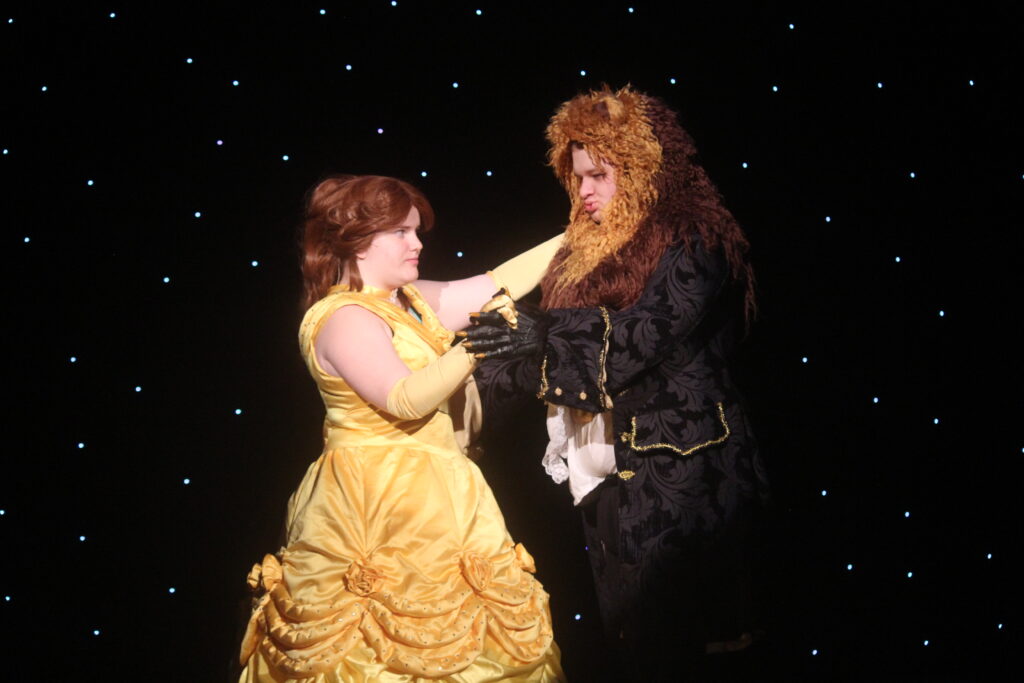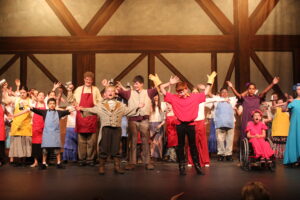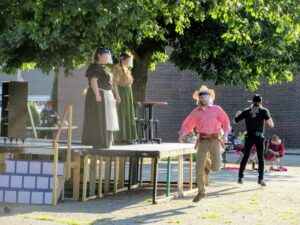
Creative Solutions to Sustain Connection
Lincoln Community Playhouse has been known for their transformative programming prior to and throughout the pandemic with The Penguin Project and the Parking Lot Plays.
Prior to Covid, The Penguin Project offered participants with special needs, ages 10- to 22-years old, the opportunity to learn roles and put on plays. Participants were partnered with peer mentors and worked together on lines, staging and all aspects of learning the production.
“People blossom in the world of ‘yes’,” said Morrie Enders, Executive Director of Lincoln Community Playhouse. According to Enders, transformative things happen when the participants are partnered with peer mentors and work together on lines, staging and all aspects of learning the production. Said Enders, “One of our artists with autism decreased his delayed verbal response time from 45 seconds to zero. Another who is nonverbal started having conversations with her mom.”

Kaitlyn, who has participated in all seven seasons, found acceptance and friends through the project. According to her mom Amy, “There is something very special that takes place every time.” Kaitlyn said, “We are all special needs kids who come together to put on a play and the mentors really care about us too!”
Jacob, another seven-season participant, blossomed too. His mom Vicki expresses how heartwarming it is to watch her son sitting with friends, something that hadn’t happened before. “When Jacob got his costume on it was like watching a light switch go on,” Vicki said.
These amazing stories of growth also apply to the peer mentors. Their lives are touched forever and develop ease with people who have special needs. Some pursue careers in special education. The Penguin Project is not simply entertainment, it is about changing lives through theatre.
The pandemic hit the Penguin Project hard. For those that thrive on routine having to go to online school, no play dates and The Penguin Project being canceled was heartbreaking. The directors put together Thursday evening Zoom meetings with the Penguins to help them stay connected.
Performances at the Playhouse also came to a halt at the onset of the pandemic. Payroll Protection Funding, CARES funding and a relief grant provided by Nebraska Cultural Endowment and the Nebraska Arts Council kept everyone employed and monthly expenses paid. “It is a great feeling knowing that NCE and NAC had our backs during the pandemic,” said Enders.
The Playhouse came upon the creative idea of doing Parking Lot Plays to provide some sense of normalcy to their patrons. Keeping people safe was of utmost importance. Creative solutions had to be worked through to make the plays possible. Using the same technology as Christmas lights that you synchronize to a radio enabled people to listen on their car or portable radios. Eventually they bought a tent and brought the sound equipment outside. People were happy to attend performances again. Nineteen performances were put on, ranging from melodramas to a Mama Mia Reunion. Every performance was sold out.
 The performances were even featured on Good Morning America in a nationwide segment. Innovation made a difficult situation more tolerable. “I believe that the theater is going to be part of the emotional recovery from this pandemic,” said Morrie Enders, Executive Director.
The performances were even featured on Good Morning America in a nationwide segment. Innovation made a difficult situation more tolerable. “I believe that the theater is going to be part of the emotional recovery from this pandemic,” said Morrie Enders, Executive Director.
Audiences are slow in coming back. The Playhouse is keeping things as touchless as possible. Working with the county Health Department to ensure everyone’s safety, an air scrubber was installed into the air system along with sanitation stations and social distancing. The 272-seat theater has been pared down to accommodate 58 people. The Playhouse is beginning to see a light at the end of the tunnel. In the meantime, they continue to stay creative.
While the recovery process is beginning it may be a while until audiences return. Your support to NCE helps organizations like the Lincoln Community Playhouse to begin recapturing ground lost during the pandemic.
